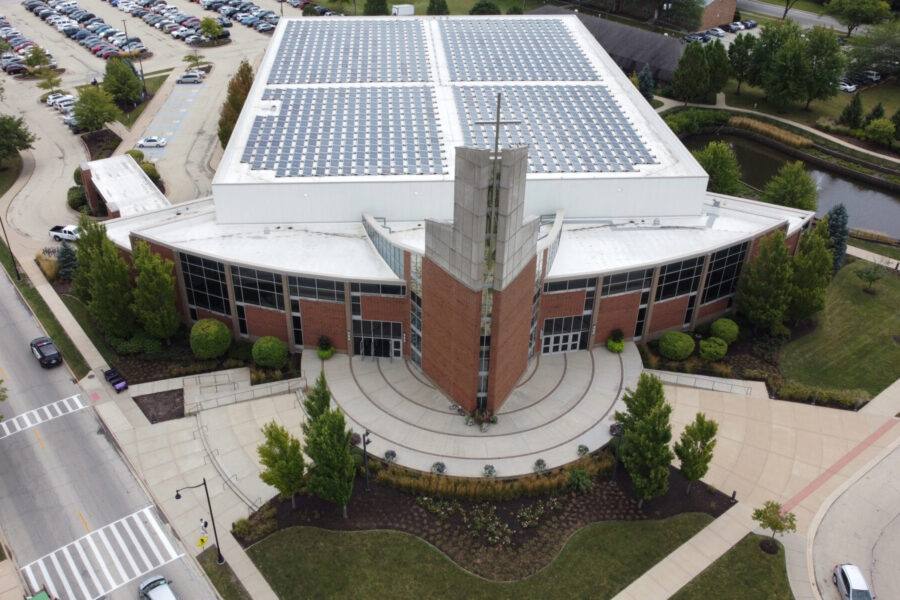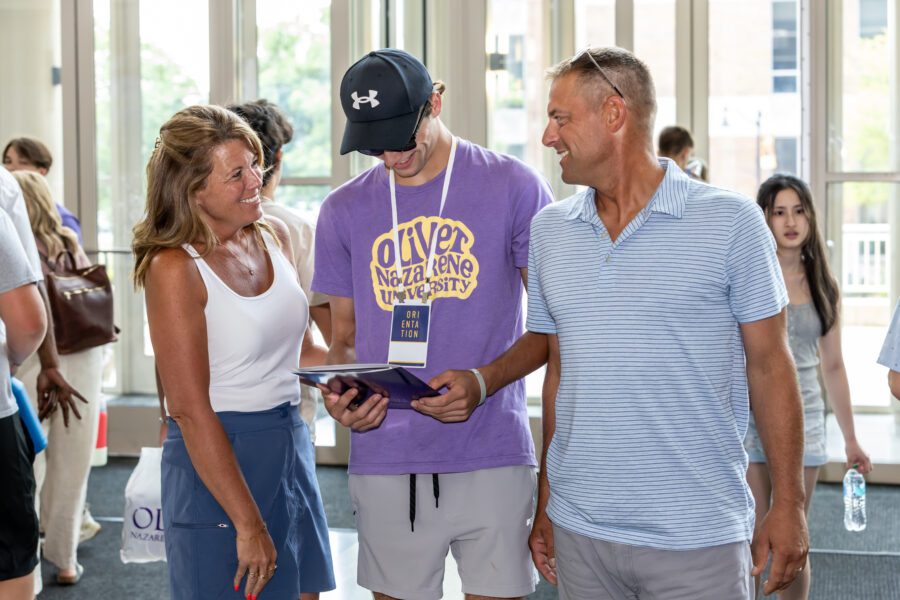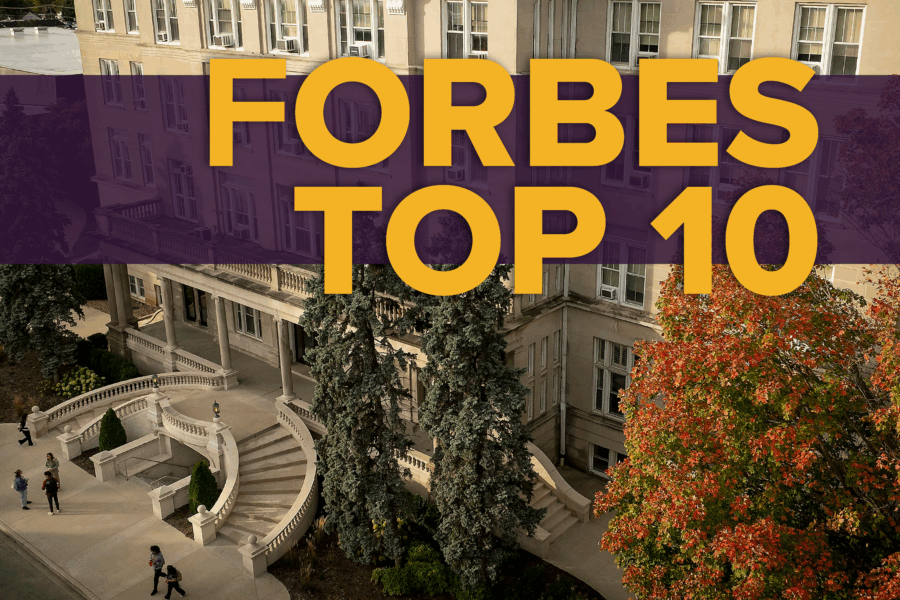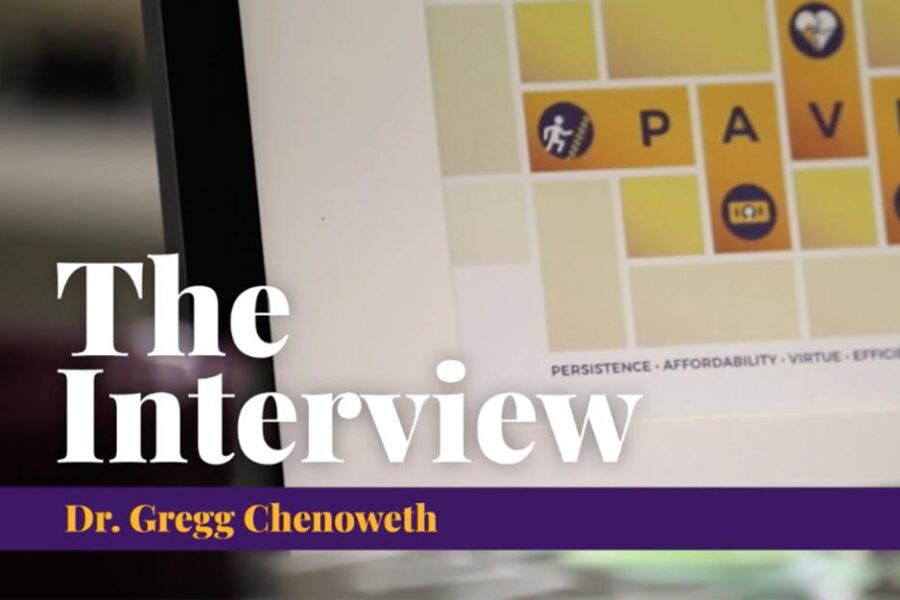
Nearly one year into his presidency, Dr. Gregg Chenoweth ’90 made time for a casual conversation with George Wolff ’93 about his vision for the University. To watch the full interview, including a special anecdote about a surprise gift Dr. Chenoweth received from his predecessor, click here.
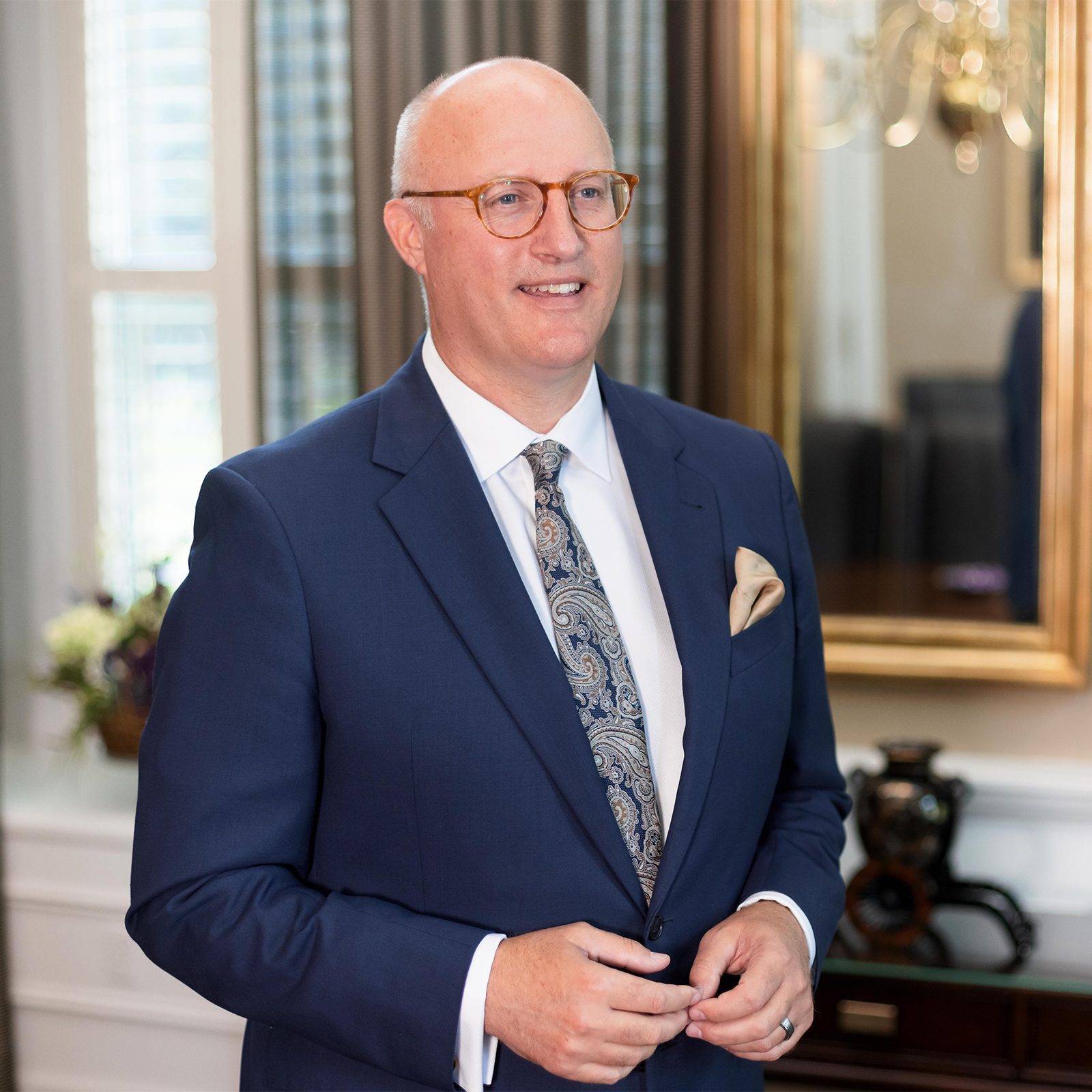
George Wolff (GW): Thanks for doing this! It’s kind of something new. Everyone across the region is not going to get this opportunity to sit down with you and have these conversations, so we tried to think of what questions that they might ask that we can possibly answer in our time together.
Dr. Gregg Chenoweth (GC): I’m happy to.
GW: One of your superpowers seems to be your ability to mobilize organizations around a specific set of priorities. Can you talk to us a little bit about the process that you’re currently leading the Olivet community through?
GC: Well, that’s a really great question. I’m arriving preloaded with some experiences, including failure that I learned from but also some successes that harden my commitment. I would say the full arc of that would be you have to figure out your presumptions and your process before you know your priorities. I am trying to be a sage, not a warrior. Instead of rushing with muscular force toward some list of things that sound impressive like a warrior, a sage wants to ask better questions and learn and listen what is well suited for our time. A priority is a just cause worthy of the institution’s sacrifice. So, we’re really trying to find the best things, not the good. Let’s be honest, we’re going to have to say no to even good things that we agree with you about. We are not trying to just find problems to solve in a vision but the controlling problems. We have to have an external perspective.
GW: Every successful organization solves problems. How do you ensure that the community remains positive when you’re talking about problems?
GC: Right. I think we don’t have to be intimidated by problems. We can be motivated by them. So, if it’s safe to acknowledge problems and if people know we’re going to say no — to even good ones — let’s say yes to the best. Then maybe it’s encouraging, actually, that we’re going to marshal all of our force and all of our energy and our resources around the very best problems to solve. We are a Christian organization. We’re Christian people. Let’s not think of this like dry data review, and let’s not think of this as just chitchat with constituents. Can’t we assume with confidence that the God Who is sovereign over everything, the God who discloses Himself, the God who speaks through this process, would guide us? Then, we would test that with unity. It doesn’t have to be unanimity but unity of purpose, unity of direction. I’m very encouraged. We really did find that it was kind of a beautiful thing to find 154 nominated priorities. We picked five and we’re not fighting over it. We think these are the best, not just the good.
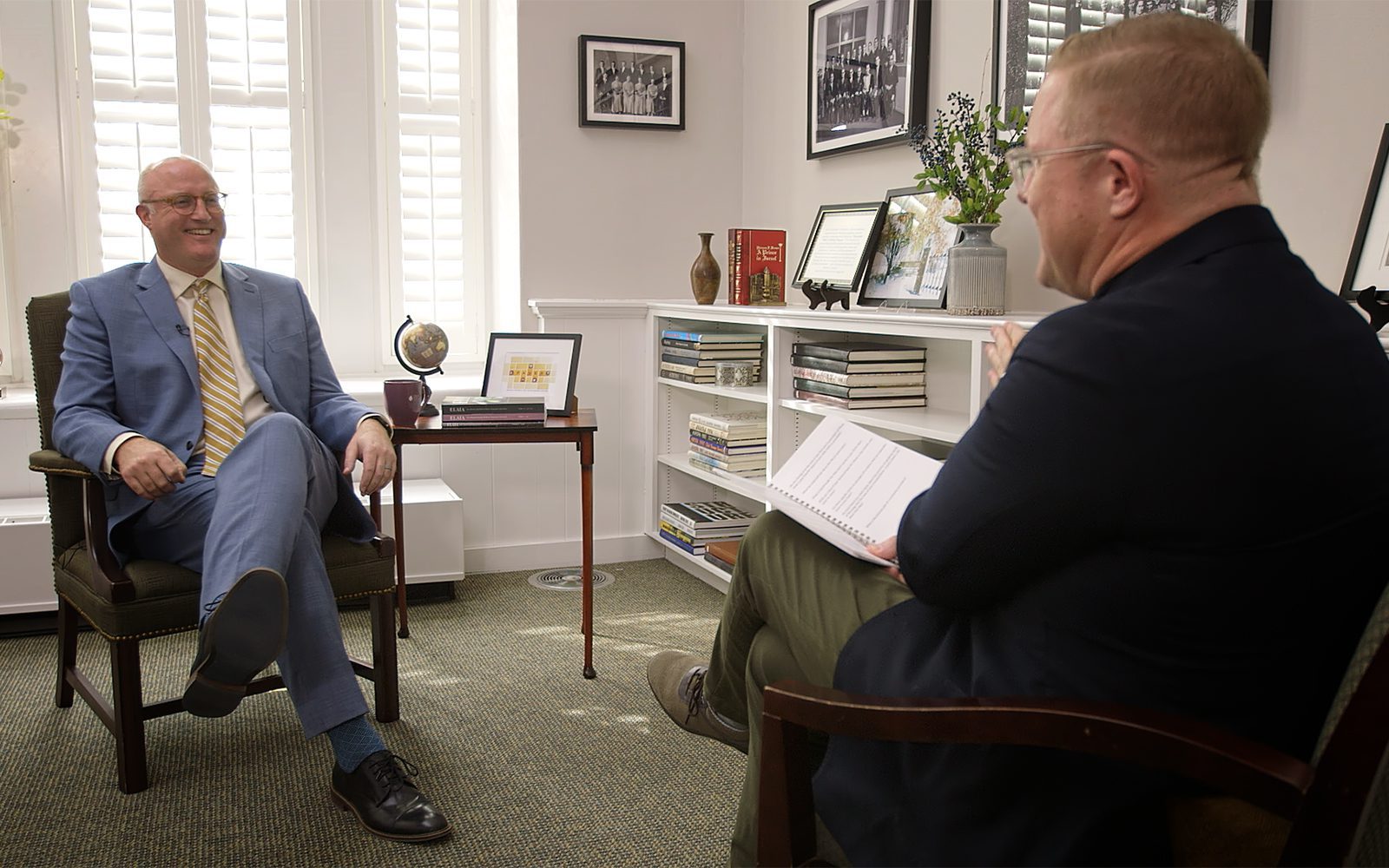
GW: Over the next weeks and months and year, we will take a deeper dive into all of the specific PAVER priorities. Let’s start with the P for Persistence: the idea that every student who enrolls at Olivet has the support and the encouragement necessary to persist to graduation, earn a degree and step into a career. Why is that such an important moment for Olivet when it comes to not just recruiting students but recruiting graduates?
GC: The good news is that our graduation rates have been climbing over time. That’s a fact to acknowledge and to celebrate. But when we look at a group of peer institutions, frankly, their graduation rates have risen faster than ours. I think it’s worth fighting over five or six percentage points of improvement. It sounds like just a number, but every number represents real lives. Isn’t it in everybody’s interest to have a student who comes to remain in seat to figure out their calling in God and actually graduate? Here’s the saddest thing in the world: A student comes, they take on debt, they give up years to do this, and then they drop out. They haven’t figured out their calling, they haven’t got credentials, and they don’t get the economic benefits. So we have a goal to set record retention and graduation rates. Persistence is about grit. You don’t earn grit and persistence by coddling. You do it by equipping and facing hard things.
GW: Olivet is a liberal arts university. The great thing about the liberal arts is you have an opportunity as a student to experience the best of all areas of education, right? Talk to me about persistence, really, with the idea of the Olivet community helping these students move along to graduation.
GC: Well, the first thing to acknowledge is the struggle and the fact that 50% of students in America — not just Olivet — change their major after their freshman year. You have to dip your toe in the water to see “Do I really want to be a veterinarian or not?” After an introductory course, it’s quite common to change. But once you’ve changed and committed, how can we rally around you?
If we’re dealing with high-volume transitions and students’ fogginess about where they’re headed, artificial intelligence software is a way to refer them to support services. So, the question might be, “Hey, you’re three months into your freshman year. Are you having any challenges?” If a person indicates in their answer something about academics, they are automatically routed to a helpful path, because providing services is of no use unless people use them. That sounds very technological, but it’s a very human thing to balance. We also need a strong staff to provide human support, because you don’t think your way through a problem; you talk your way through it. We are creating a network of support that privileges, first, the most at-risk students. That’s not to say that other students don’t need support, but there’s a reason why firetrucks pass by many houses that are on fire and stop by the one that’s burning. We’re not discriminating against the ones who don’t need help. What we’re saying is some people have a burning platform in their life, and let’s rush to them first.
GW: You’re coming up on what I’m sure is hard to believe: the marker of your first year. Tell me about humans that you’ve met — maybe some relationships that you’ve made here. What have you discovered in all that community that was maybe new to you?
GC: One thing I’ve been saying is let’s not make the mistake of assuming too much from our familiarity. And there is familiarity. But I ask people, “Have you changed in the last eight years?” I’ve been away too. I’ve changed — God help me, for the better — but I’m returning a different person. Not in my nature or my essential values … but I’ve learned from my life. Well, people often giggle and say they have changed too. The world has changed. Olivet has changed. We’ve changed as people. So, to answer your question about surprise, it’s been, I would say, a fun sort of transparent disclosure among familiar people in a familiar place about change.
GW: You were elected president at the height of a major global pandemic. First of all, congratulations that we’ve come through it mostly unscathed. I feel like we’ve been able to see the Olivet community rise to the occasion and say, “We can do this and still remain who we are.” Talk to me a little bit about what that was like for you.
GC: When we were trying to respond to what has what we now know is the greatest medical emergency and crisis in at least a century, I found myself actually energized by that. And that sounds very strange. Many people would say, “I’m worn out. I’m fatigued.” I’d say, “I respect that, but I’m not.” I felt opportunity in coming to work, to work with people I know and trust who care and who are smart — in fact, who know many things better than me. I felt it was an honor to try to provide peace where there was chaos. That’s what a crisis response is. These are institutional tools: to bring peace where there’s disorder and chaos. So, for me, I just felt like because trust was high and we had enough, we already have what we need. We’re not lacking anything. We have maturity here. We have collaboration and coordination here. We have values that are already articulated.
GW: There’s a lot of talk about what is going to happen to students — young people. They’re going to meet challenges. What is your hope for what you’ve been able to witness among even our student body, our faculty, our staff for this generation?
GC: This may sound a little direct. I hope it’s not harsh. But it’s a basic philosophical concept. You don’t develop grit by being protected from difficulty. You develop grit and persistence for life by facing it. That doesn’t mean that I want to have low empathy and be disrespectful of the pain and difficulty people have. But what we want to do is to remind people, “What if you already have what you need, and this is a chance for you to dig down and find that?” What if a loving God permits you to struggle? He still loves you and He’s aware of you. But how do you reconcile that? Well, it’s because His ultimate project in you is for your wisdom, not your wealth. It’s for your holiness, not your health. And it is for a soul that’s permanently surrendered to His purposes — that’s fit for eternity, not fear. The Bible says that He prunes dead branches off of us. If I don’t get what I want from my prayers, what is being pruned off of me that will flourish in this place? How has my suffering made me or remade me in the image of God? We have to lean into difficulty rather than evade it.
GW: And it is great preparation, because then you’re not surprised when it does happen, right? Is there a Scripture verse as president that is the first thing you think of every day — that you have written down or stuck to your computer or on your phone?
GC: I’m sort of giggling and smiling as you asked. Yes. The Holy Spirit has been so faithful over the full arc of my life. There are timely Scriptures that are foundational for me. The one since I came to Olivet is Colossians 1: 9-10. I’ll paraphrase: “Lord, give me knowledge of Your will. Give it to me through spiritual understanding.” I’m reading that not as dry generic business plans but [as] the revelation of God through spiritual understanding so that we might live a life worthy of the Lord, which was, by the way, sacrificial that we might please him in every way and bear fruit in every good work.
Drop the mic. Shazam. It has more conviction than just head knowledge. It justifies our sacrificial living: a life worthy of the Lord to pick the best things and to make change where necessary. They are things that I believe are the good works that we could bear fruit in. I have this crazy idea that we are fruitful in Olivet — in everything.
GW: Sometimes the fruit is another problem to solve — which is OK, right? It’s another opportunity for growth. Would you like to share a couple of your dreams and hopes outside the paper initiatives for the months and years to come?
GC: Actually, I would! Vision is pragmatic. Which problems should we be solving here? But there is something else that might feel a little poetic and broad: a generational hope for Olivet that extends beyond me.
Could we educate a future Supreme Court justice? Why not here? Why not us? Why not, through Olivet, let us educate a future scientist who cures cancer? Hear us, Lord. What about an artist that comes through here whose unusual giftedness reaches the eyes and hearts and ears of heads of state that turns their heart toward eternal things in a way that fancy speeches never could?
There is this hopefulness that something profound and miraculous is happening every day. Even in the middle of winter, in the middle of a week, when nobody expects anything out of that day, you might walk by a classroom or laboratory or the theater, [and] there’s a light being flicked on inside of a student that gives them something deeper than a career. It’s a calling, and the calling that they discover is a unique gift. They’re unintimidated by any glass ceiling that ever comes across their way.
I recently had dinner with a young alumnus who’s one year out of Olivet and is now at Pepperdine Law School. I asked him, “Have you ever thought about being so ambitious to be a Supreme Court justice?” He said, “You know what? I remember when I was in elementary or junior high school, and I had to do a project in class: ‘What’s your dream?’” He said, “Come to think of it, I haven’t thought of it in years, but I wrote that dream down. I want to say, why not? And why not now?” That would be a beautiful thing.
GW: What would you say is your primary job as president?
GC: I’m the living logo for Olivet. I’m the mission with shoes on, and so that inspires me to try to be my best whether I’m at the grocery checkout aisle or at a microphone. In that sense, it’s a responsibility and honor. It’s my job to personally live and demonstrate our mission and our values to assure high fidelity to our purpose, to identify what our priorities are and, in working with others, to make sure there are systems and processes to execute well on them. It is to assure that our work culture is healthy and vibrant. I need to own that.
GW: That’s great. We’ve heard you share about your practice of speaking words of blessing into the lives of your grandchildren. Talk to us a little bit about that.
GC: Yeah, you know, I’m a middle-aged guy. I have grandkids now. It does something to you. And I’ve been thinking a lot about what it means to be a patriarch. One of the answers is you have a voice. Use your voice to bless your family. What I mean by that is I want to vocalize my hope in God for them.
So we have a new tradition when we visit our three adult kids, who are all married. When we are about to leave, I’ll say “I want to bless you before I go.” It’s me putting my arm around them or my hands on their shoulders and looking them in the eye and just asking them something like, “What do you hope God is most sovereign over in your life right now?” or asking something like, “What’s at the top of your heart or the top of your mind of concern?” And then I’m just praying: “Holy Spirit, remind me of what Your Word says, because we’ll all take more confidence if we can remember what Your Word says than what I would say.” What I’m vocalizing to them is my hope in God. It’s simple, but it’s intentional. And I take joy in that. I want to encourage people. I want to be life-giving.
GW: I did not know that! That’s extraordinary. Well, congratulations on your first year and thanks for making time for this!
GC: I’m honored. I hope it reaches the right people in the right way.
Published 5/2/2022
LB

